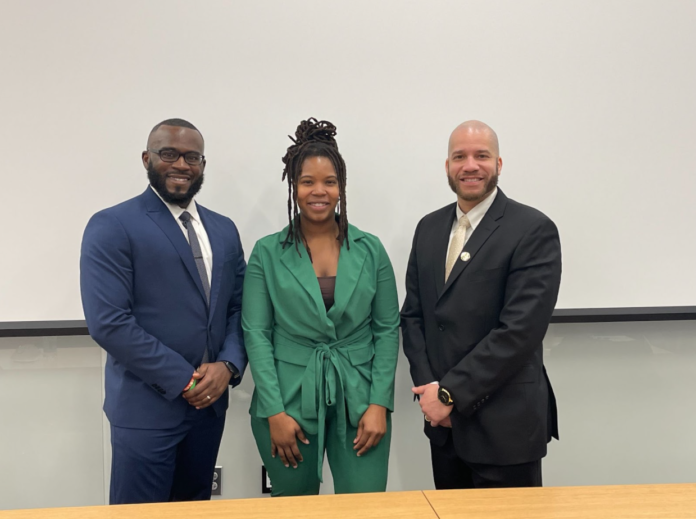
On Thursday, Feb. 24, Rowan University welcomed three medical professionals of color to the Business Hall to discuss their unique experiences as medical professionals and as people of color.
The event was hosted by the office of Pre-Health Programs Coordinator Keyona Gonzalez-Walker, the Pre-Health Advisor Julius Grayson was and moderated by Isaiah Hughes, a Cooper Medical School student at Rowan.
The guest speakers included Dr. Shakeilla Howell, Dr. William Murray and Stephen Robinson.
Dr. Howell completed medical school at Howard University College of Medicine in Washington, D.C, and completed her residency at Montefiore Medical Center in the Bronx. As an undergrad at Xavier University of Louisiana, Dr. Howell majored in biology and minored in chemistry. She focuses on combining holistic medicine with conventional medicine to find the right care for her patients.
Robinson, a Rowan graduate who majored in biological science with a concentration in pre-med, is a cardiovascular perfusionist at Temple University Hospital in Pennsylvania.
Dr. Murray received his doctorate from Temple University and is currently a podiatrist at Cornerstone Foot and Ankle in South Jersey, with an interest in foot and ankle reconstruction. During his time as an undergrad, he majored in exercise science and sports injuries.
“Each of us has such a remarkable biography, but it’s important to learn about the journey and also it’s just as important to know that you’re not defined by the ups and downs of the journey,” Dr. Howell said in her opening statement.
Each of the professionals shared their experiences on how they came to want to work in medicine and described their time as undergraduate students.
Dr. Murray first became interested in healthcare after sustaining an injury in high school. The expertise the medical professionals showed at the office stuck with Dr. Murray ever since.
“I had a fantastic experience,” Dr. Murray said in regards to his time as an undergrad.
He also expressed the importance of finding your tribe and how individuals don’t have to major in biology to enter the medical field.
Robinson noted that his GPA wasn’t where he needed it to be, prompting him to attend a post-baccalaureate premedical program. Robinson took the MCAT three times, once while at Rowan and twice during his post-baccalaureate program– each time “eating his soul.”
Robinson also was interested in becoming a medical professional after being injured when he was a child after a brick was thrown at him while playing a game outside with friends.
“He’s stitching up my lip and he’s having a normal conversation with me like nothing is happening. . . That healthcare professional [calmed me down], at that point on, I wanted to do that,” Robinson said.
Dr. Howell, however, had a distinctly different experience while an undergrad.
“Undergrad was extremely challenging for me,” Howell said. “I wasn’t prepared for college. What really helped to get me through was finding other people who knew how to study because I didn’t know how.”
Dr. Howell’s key to doing better was tutoring, studious friends and budgeting her time efficiently.
“You might not get to that original goal, but it doesn’t take away from your journey, it doesn’t take away from your value – the doors that are meant to open for you, are going to open for you,” she said.
After looking for a sign on whether or not to continue in the medical field, Robinson began to look into other jobs within the medical field. Robinson applied to nine schools in Pennsylvania, looking into other positions such as being a nurse practitioner, and one perfusionist school. He was denied at all the schools, except for the perfusionist school.
“This is it. This is where I’m meant to be,” Robinson said. “You don’t have to be a doctor to help people.”
When asked what it was like having other Black people, or people of color, feeling a sense of relief when they see they’re being treated by someone who looks like them, each professional thought it was extremely fulfilling.
For Robinson, it’s a similar feeling to doing “the nod’’ when he sees another Black man in an unfamiliar place.
“I think as fair-skinned as I am, I have a unique take on this, especially in this time of COVID-19. A lot of times, people don’t see my facial features, they don’t see who I am, they may even think I’m our managing partner who’s an older white guy because I’m bald and all you can see is my brown eyes,” Dr. Murray said. “Precovid, it was even more fulfilling because you walk into the room and it’s almost like you can see a weight lift off their shoulders.”
Dr. Howell described it as a feeling like no other.
“I’m just as happy to see them as they are to see me,” she said. “I just feel so privileged. I’m a people person so I can connect with you whether it’s on our race or spirituality – so many different things. But, to connect on that level, is also such a beautiful experience because there’s an unspoken understanding.”
For comments/questions about this story tweet @TheWhitOnline or email thewhitnews23@gmail.com.





